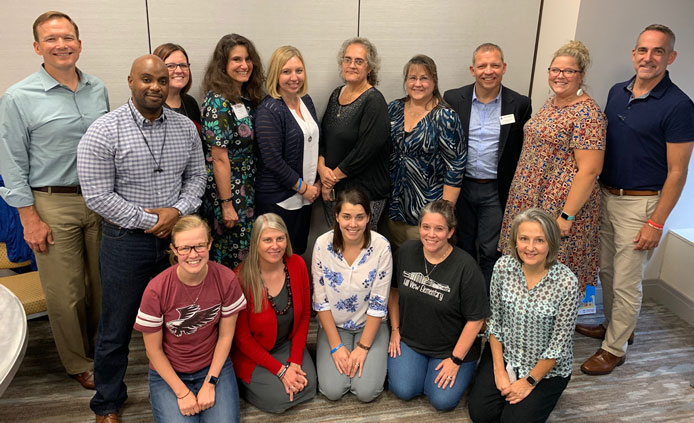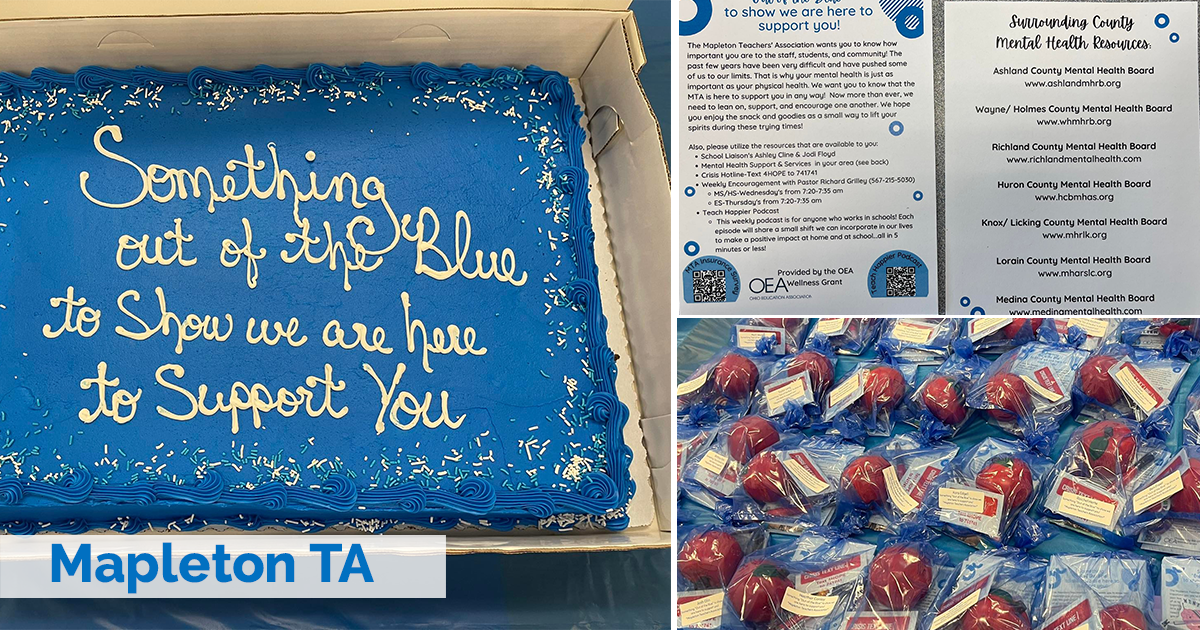December – January 2022 Ohio Schools
- COVER STORY: Stepping Up for Schools
- Educator voice key to successful school board races in Ohio
- NOTEBOOK
- OEA Local Associations Stand in solidarity for Members and Students
- MAKING THE GRADE
- Findlay Paraprofessionals Form OEA’s Newest Local Association
- OEA Members Receive Top Educator Awards from Martha Holden Jennings Foundation
Moved recently? Contact the OEA Member Hotline to update the address on file at 1-844-OEA-Info (1-844-632-4636) or email, membership@ohea.org. Representatives are available Monday-Friday, from 8:30 a.m. to 6 p.m. | OhioSchools — Past Issues

 Oh Yes, We’re Social — Join the Conversation!
Oh Yes, We’re Social — Join the Conversation!
December 2021 OEA Retirement Systems Update
STRS Funding Level Improves
During its October meeting, the STRS Board received the results of the actuarial valuation of the pension plan. As of the end of fiscal year 2021 (June 30), the pension plan was 80.1% funded. This is an improvement from 77.4% the previous year. Very strong investment returns during the period were largely responsible for the improved funding.
Not all of the investment gain of FY 2021 is reflected in the actuarial valuation because gains and losses are smoothed over a four-year period. Using the market value of assets, the funding ratio is 87.8%. This is significant as the STRS Board policy says that they will consider benefit improvements that do not impair the fiscal integrity of the pension at 85% funding.
It would be unwise to make permanent changes based on one year of investment returns. OEA believes that at least a short-term restoration of the cost-of-living allowance (COLA) coupled with a decrease in the employee contribution rate is merited. It has taken shared sacrifice of retirees and active employees to greatly improve the funding status. The members and beneficiaries of the system should reap those rewards.
Cheiron, the Board’s actuarial firm, has noted that the pension plan is still vulnerable to adverse experience. Unfunded liabilities are greater than $20 billion and STRS pays out billions more in benefits each year than they collect through contributions. The actuary has recommended that any consideration of benefit improvements should be delayed until after the completion of the five- year experience review (expected in March 2022).
STRS Board Members Pitch Questionable Investment “Partnership”
During the STRS Board’s November meeting, two current Board members presented a “new business opportunity” for STRS. Wade Steen (Governor DeWine’s appointee to the STRS Board) and Rudy Fichtenbaum (a retiree representative) advocated for the creation of a public/private partnership with a firm called QED. Under the proposal the company would facilitate access to STRS assets by a counter party who would execute asset swaps resulting in profits from arbitrage for the counter party.
During a lengthy discussion, it was revealed that QED currently has no assets under management and no track record of performance. Further, STRS would provide 100% of the assets in the “partnership” and receive 25% of the profits. Mr. Steen had previously indicated that he had an investment plan that would return $4 billion in revenue while reducing risk to the portfolio. Based on the discussion, in order to achieve that level of return it would be necessary to devote $65 billion in assets (two-thirds of all STRS assets) to this new enterprise. A proposed motion to hire outside council to negotiate an agreement with QED was never offered
SERS Receives Actuarial Valuation Results

Cavanaugh Macdonald Consulting, SERS’ actuary, presented the results of the fiscal year 2021 actuarial valuation at the SERS Board’s November meeting. The funded status of the pension plan improved from 71.5% to 74.5%. In the actuarial valuation, investment gains are recognized over a four-year period. The funded ratio based on the market value of assets is 82.9%.
Strong investment returns also contributed to extended solvency for the SERS health care fund. The fund is projected to be solvent until 2058. The system’s funding policy allows the Board to allocate up to 0.5% of the employer contribution toward the health care fund if the pension funded ratio is between 70-80%. However, the Board voted to dedicate the full 14% of employer contributions towards basic benefits.
–
OPER Board Lowers Expected Rate of Return Assumption
After hearing the results of a five-year experience study presented by their external actuary, the OPERS Board voted to reduce its assumed rate of return. The change reduced the assumed rate from 7.2% to 6.9%. This was the most impactful among several changes in economic and demographic assumptions of the pension plan.
Assumption changes added almost $2 billion in unfunded liabilities to the plan. The funded ratio was 82.9% as of the last actuarial valuation and the funded ratio would drop to 81.5% based on the changed assumptions.
![]() Click here to download a copy of this December 2021 Report to the OEA Board of Directors. Previous Retirement Systems Updates can be viewed under the Affiliate Resources tab on the OEA website.
Click here to download a copy of this December 2021 Report to the OEA Board of Directors. Previous Retirement Systems Updates can be viewed under the Affiliate Resources tab on the OEA website.
A Typical Teacher’s Brain in an American Public High School on Any Given Day
By Julie Holderbaum, Minerva EA/OEA
Is Michael acting off today? Is he tired or just depressed? Should I pull him out into the hall and ask him if he’s okay or would it be worse to draw attention to him? Should I call home? Have his grades been slipping? Did he do the assignment that was due for me today?
 Does Becky have her cell phone in her lap? Why isn’t it in the slot with the others? Is it worth calling her out on it? Right now or later, privately? Either way, do I want to risk setting her off when she’s been doing so well and we seem to be forging a tentative relationship? Is it a big deal if she isn’t actually using it? Has she been using it and I just haven’t seen it happen?
Does Becky have her cell phone in her lap? Why isn’t it in the slot with the others? Is it worth calling her out on it? Right now or later, privately? Either way, do I want to risk setting her off when she’s been doing so well and we seem to be forging a tentative relationship? Is it a big deal if she isn’t actually using it? Has she been using it and I just haven’t seen it happen?
Why isn’t the Chromecast working? Why would it work last period and not this period? Is the internet down?
Why are we either freezing or frying? Wouldn’t it be nice to be able to regulate the heat in our own rooms?
Will I be accused of teaching divisive concepts if I lead a discussion about why we are not going to say the N word out loud when we read Of Mice and Men? Will the kids go home and tell their parents what we talked about? Do kids still do that? Do parents still ask? Is this book worth the battle it might lead to or should I just teach Fahrenheit 451 instead? Wouldn’t that be ironic? Isn’t this exactly what those who scream about CRT being taught want? For teachers to fear the repercussions and give in to temptation to just teach “safe” material instead? So that the status quo will keep on keeping on and generations of kids will continue to grow up in the dark about so much of the ugly side of America’s history? Is it worth the fight this might bring? Well, it’s obviously worth the fight, but am I mentally and emotionally up for this battle, this year especially?
More importantly, will my black students be uncomfortable if their white teacher leads this discussion in class? I know enough not to ask a Black student to speak on behalf of an entire race, but would it be okay to privately ask a Black student how they would feel about this book or that sort of discussion?
 Should I grade these 45 quick 10-point responses first or 25 longer essays? Go back and forth between the two? Am I fair to every student when I don’t grade an assignment all at once? Do I grade the first essays harder or easier than the last ones?
Should I grade these 45 quick 10-point responses first or 25 longer essays? Go back and forth between the two? Am I fair to every student when I don’t grade an assignment all at once? Do I grade the first essays harder or easier than the last ones?
Why do I feel guilty when I take points off for not capitalizing “I” or proper nouns? Why don’t they click on the squiggly lines and fix their typos/spelling/grammar errors when the computer is literally marking them for them? Why are they still making these basic mistakes when we have gone over them so many times? Do they just not care about their grades? Do they even go back and read my comments and look at why they lost points? Is this an academic issue or a motivation issue or a self-worth issue? Do we need to do more lessons on catching these mistakes or do I need to talk with them about the importance of the impression of themselves they put out into the world? Is it unfair for a student to earn a C for a grade when the content of their work is probably at a B or even an A level, but their spelling and grammar mistakes are so ubiquitous and egregious that they lose points on every assignment? Is it asking too much of them to CLICK ON THE DANG SQUIGGLY LINES?
Am I becoming the old cranky English teacher who nitpicks and loses sight of the big picture? Am I too tired for this job? Am I becoming too cynical? Are my standards too high? Haven’t I lowered them since I began teaching all those years ago, though? Should I have?
Should I work through lunch or head to the workroom? Will I feel better if I have a half-hour of adult conversation or if I get more of these papers graded? Do I need to make any hard copies of the handout for next period? Did I remember to upload the video and Google doc to Google Classroom for the kids who are absent?
Is that yelling in the hallway? What’s going on? Did one of you just call the other a bitch?
Why are the kids behaving like this this year? Is it COVID-related? Or just the stress of COVID plus all the other division and dissension in society that we are all contending with?
Does that kid who just smiled at me and said “Hey, Ms. H!” have any idea how much I needed that friendly smile right now?
 Why is the office calling down that long list of kids? Are they getting quarantined and sent home? Wait, they don’t have to stay home anymore, but they have to wear masks now, right? Will we get a list of kids who are supposed to be wearing masks for two weeks? How will I keep track of that? How many more times can I say “pull your mask up over your nose” before I start inserting curse words into that sentence?
Why is the office calling down that long list of kids? Are they getting quarantined and sent home? Wait, they don’t have to stay home anymore, but they have to wear masks now, right? Will we get a list of kids who are supposed to be wearing masks for two weeks? How will I keep track of that? How many more times can I say “pull your mask up over your nose” before I start inserting curse words into that sentence?
Do I have time to run to the bathroom between classes? Risk someone being in the single-stall teacher bathroom or go to the student bathroom further away? Is that crying in the next stall? Hey, are you all right? Do you need to talk? Which class do you have right now? Can I walk you down to the guidance office? (Will my class of freshmen be okay if I get there a little late?)
Can we settle down and get started, please? Where is your chromebook? Why isn’t it charged? Where is your charger? Why haven’t you borrowed one from the library then?
Is this email for real? Are they kidding with this? Another meeting? A new book study? This year of all years? Don’t we have enough to do? Can’t they just give us more time to plan or collaborate with each other on the ACTUAL work that needs done?
Am I getting sick or am I just exhausted? Is my throat sore from talking so much today or because I’m coming down with something? Will they be able to find a sub if I stay home tomorrow? What am I teaching tomorrow? Is it something I can adapt easily for a sub or will I need to come up with something new? How much will that impact my plans for the rest of the week? (Why can’t I be more of a Type B teacher?) Isn’t it just easier to suck it up and go to school with a cold? But what if it’s COVID?
 Is that an email from a parent? Do I have the energy to deal with that tonight? Why are they emailing me so late?
Is that an email from a parent? Do I have the energy to deal with that tonight? Why are they emailing me so late?
Where is that info about the poetry contest? When was the deadline? How did I not know until now what a great writer Jane is?
Oh no, Michael didn’t do the assignment; is it too late to call home tonight or should I wait and call from school tomorrow? Do his parents work during the day? Do they support his use of he/him pronouns? Do I need to refer to him as Michelle when I talk to them?
Why am I watching the news? Is the legislature seriously going to try to pass that? Do they have any clue how that will impact teaching and learning? Why do the people with the power to address some of the problems always seem to arrive at “solutions” without asking educators for feedback? Don’t they realize that only leads to more issues?
Oh my God, another one? How many school shootings does that make this year?
Are all teachers as overwhelmed and exhausted as I am?
Does anyone care what teachers are going through in this country?
When is someone going to do something about it?
— Julie Holderbaum is an English Instructor and an Academic Challenge Advisor at Minerva High School, Minerva, Ohio.
The Benefits of Shopping with NEA Member Benefits

HOLIDAY SHOPPING USING NEA MEMBER BENEFITS
NEA Members can really make their membership pay this holiday season using their NEA Member Benefits! Want to learn how? Join us through ZOOM on any of the dates and times below using the same zoom link for any and all. Give us 30 minutes and we just might change the way you shop now and after the holidays. No pre-registration is required.
December 6 starting at 4:30 P.M. Eastern and REPEATED again at 5:05 and 5:40
December 8 starting at 7:30 A.M. Eastern and REPEATED again at 7:35 and 8:10
December 9 starting at 6:00 P.M. Eastern
These events have ended.
OEA urges swift Senate passage of Build Back Better act
“The Build Back Better framework will change lives here in Ohio by making enormous strides toward ending child hunger and poverty, addressing a growing nationwide teacher shortage, and investing in early education, job training, and higher education programs to allow all of Ohio’s students to pursue their dreams, regardless of where they’re from or what they look like,” OEA President Scott DiMauro said. “Ohio’s 1.7 million public school students can’t afford for the Senate to wait to act on this plan.”
Among other benefits included in the Build Back Better framework, it will:
- Enable Ohio to expand access to free, high-quality preschool to more than 151,420 additional 3- and 4-year-olds per year and increase the quality of preschool for children who are already enrolled
- Increase maximum Pell Grant awards by $550 for students at public and private non-profit institutions, supporting the 172,095 students in Ohio who rely on Pell, to help unlock the opportunities of an education beyond high school
- Invest in Ohio’s 7 minority-serving institutions and the students they serve, including Historically Black Colleges and Universities (HBCUs), Tribal Colleges and Universities (TCUs), and Hispanic-serving institutions (HSIs)
- Ensure that the nutritional needs of Ohio’s children are met by expanding access to free school meals to an additional 153,000 students during the school year and providing 844,631 students with resources to purchase food over the summer
- Provide opportunities for 43 public community colleges in Ohio to benefit from grants to develop and deliver innovative training programs and expand proven ones
- “A high-quality preschool education lays the foundation for a lifetime of success for our students,” said Traci Arway, a special education teacher in Columbus City Schools. “I am beyond excited to know that Ohio will receive funding through the Build Back Better framework to increase early childhood education for our youngest Ohioans!”
“Teachers know that our students need to have their nutritional needs met to be focused in the classroom. The Build Back Better framework expands free school meals so Ohio’s students can focus on their schoolwork instead of how they’ll get their next meal,” said Kara Jankowski, who teaches English Language Learners in West Carrollton City Schools.
“As of now, only about 31% of the three- and four-year-olds in Ohio have access to publicly-funded preschool, and it costs nearly $8,600 per year for those families that cannot access a publicly funded program. This is unacceptable,” said Larry Carey, a preschool teacher in Columbus. “The Senate must do its part and pass the Build Back Better act now.”
“The Build Back Better framework is a smart investment in our children, our state, and our future,” DiMauro said. “The Senate must seize this once-in-a-generation opportunity to create a better tomorrow for all of us.”
Wellness Grant
OEA’s Wellness Grants Help Locals Support Member Well-Being
- Up to $5/per Active Member
- Submission and Approval of Application Required
- Activity Must be completed between September 3, 2024 – May 31, 2025
- Receipts must be submitted for Reimbursement by June 15, 2025
- Share photos with LRC to post on the OEA Wellness Website
- Contact LRC for Application
- Share your events on social media using #OEAWellnessGrant, #OEAWG, and #OEAWellness
- Click here to download a Wellness Grant application
- Wellness Grants Funds cannot be used for the following: T-shirts, Gift Cards/Gift Certificates, Cash Gifts to Members, or Lottery Tickets
WELLNESS GRANT ACTIVITIES
- Laughter As The Best Medicine – Set a movie event for members. A comedy or light-hearted movie is suggested. Provide members with movie “snacks” as they share an opportunity to laugh alongside fellow members.
- Social Time Members Uplifting Members – Organize an event – perhaps a happy hour or coffee chat – where members can relax and spend time together in a social setting.
- Pop-up Café – Set up a pop-up café that offers members snacks and positive messages. The café could be as simple as a table staffed by other members or a coffee/tea bar.
- Drop-in Spa – Create a drop-in spa for members in buildings. Members can sign up for time to experience a relaxing environment with a massage chair, healthy snacks, and beverages.
- Wellness Passport/Self-Care BINGO – Provide members with a Wellness Passport with pages to be stamped for each self-care activity they do on their own. Create a BINGO card with self-help activities for members to complete. The activities for the passport or BINGO card could include such things as: exercise classes, virtual challenges, book clubs, and meditation. Award members with a gift with a completed passport or completed BINGO card.
- Special Delivery! – Create a monthly drawing for all members. Winners will receive a special delivery of flowers, cookies, candy, self-care bags, or books, and a positive message from their local.
- Lunch and Learn – Invite members to an hourlong lunch and training focused on a wellness activity or skill such as meditation or an art/craft. The lunch hour could include a speaker on a topic related to self-care. Ask members to complete a self-care survey during the lunch and learn.
- Keep Active and Be Healthy Challenges
• Walk/Step Challenge – Provide each member who signs up for the challenge with a promotional Local water bottle, notebook, pen, and information on the health benefits of walking. Create a members-only Facebook or Instagram page for the challenge. Ask participating members to set a personal goal for the 30-day challenge, keep track for 30 days, and post/share positive thoughts via social media.*
• Sleep Challenge – Provide each member who signs up for the challenge with a sleep mask, earplugs, herbal tea, notebook, and information on the health benefits of sleep. Create a members-only Facebook or Instagram page for the challenge. Ask participating members to set a personal goal for the 30-day challenge, keep track for 30 days, and post/share positive thoughts via social media.*
*Members who complete the 30-day challenge receive a certificate and gift - Local’s CHOICE! – Develop a Wellness Themed Activity of your own!
“I got great feedback from some staff that said they appreciated the nice surprise on a cold Monday morning – a goodie bag with items with a note attached explaining how each item can be applied to their own personal wellness”
A sample of locals who have received a Wellness Grant
ESP Educator Voice Academy
Overview
In 2019, the NEA created the Educator Voice Academies (EVAs) to help build an understanding of opportunities within ESSA and the power of lifting and amplifying educator voices for state and local affiliate members. This effort was led by NEA Education Policy and Practice in partnership with NEA’s Center for Organizing, Center for Social Justice, Center for Advocacy, Center for Great Public Schools, and Center for Governance. The first cycle featured in-person learning opportunities that brought state and local teams together to brainstorm, collaborate, and create plans of action to help continue this work in their school communities. Ohio’s 2019 team chose to organize around improving our state’s school accountability system, and that work helped lead to the successful passage of HB 82, which eliminated the A-F school report card and instituted an OEA-sponsored “student opportunity profile” which will be implemented after the 2022-23 school year.
After the success of the initial Educator Voice Academies, the NEA collectively and collaboratively sought to continue moving this work forward to leverage the voices of our members as partners in delivering equitable opportunities for all students across race, ZIP code, background, and ability. These efforts moved us into the next phase of our work: highlighting educator-created plans to improve public education focused on specific priority issues.
In 2022, OEA formed state Educator Voice Academy teams to address issues related to Teacher Recruitment & Retention and Social & Emotional Learning. From that process, OEA has laid out a comprehensive set of recommendations for addressing the growing educator shortage crisis. (Click here for details.) One of the signature recommendations of the team working on the teacher shortage was establishing a new team to focus specifically on the need to recruit and retain education support professionals (ESPs) in Ohio’s public schools. Acute shortages of bus drivers, paraprofessionals, cafeteria workers, school secretaries, and other essential workers have significantly disrupted student learning, strained school working conditions, and highlighted the need to invest in our ESPs. The OEA Educator Voice Academy cadre for Education Support Professionals will develop advocacy and organizing strategies to ensure every student in Ohio is served by caring, qualified support professionals who are respected, given the resources they need to be successful, and reflect the diversity of our population.
Process
OEA is currently building a team of ESP members from a diverse mix of races, genders, job classifications, experience levels, and education settings from across Ohio. Applications may be submitted using the form linked on this page. This Educator Voice Academy team will be facilitated by an OEA officer with support OEA staff and will draw on resources from NEA. The schedule and format of meetings will be determined by the team, but it will involve a combination of virtual and in-person meetings held between January and the summer of 2023. Members will not be required to meet during normal working hours.

Big wins for pro-public education candidates should give state lawmakers marching orders
“Certain politicians tried to hijack this election season and turn community members against schools and teachers to keep us from coming together to demand that every school get the resources needed to provide every child with a quality education, but Ohioans overwhelmingly rejected that scheme,” Ohio Education Association (OEA) President Scott DiMauro said. “Ohio’s lawmakers have received clear marching orders from the people to support public education by fully implementing the Fair School Funding Plan, blocking the so-called Backpack Bill that would weaken Ohio’s public schools, and championing honesty in education to keep Big Government out of Ohio’s classrooms and ensure the anti-freedom House Bills 327 & 322 never pass.”
Statewide, pro-public education candidates, including a large number of educators, came out on top in their respective school board races, winning more than 80 percent of the contests in Ohio that OEA tracked. “That is a monumental success rate,” DiMauro said. “To put that in perspective, renewal levies – which are essentially the only slam dunk issues on Ohio’s ballots – pass at about that same rate.”
From Columbus to Kings to Centerville, Worthington, Copley-Fairlawn, and Sycamore, among others, whole slates of pro-public education candidates won seats. Slates of anti-honesty in education candidates failed to gain control of school boards across the state, regardless of the makeup of the districts or region.
“Ohio’s voters saw right through all the nonsense and manufactured controversy around masks, vaccines, and curriculum this election season, and Ohio’s lawmakers should take notice: Attacking local public schools is fast becoming the third-rail of Ohio politics,” DiMauro said. “Voters want Ohio policymakers to fulfill their constitutional obligations to provide great schools for all of Ohio’s children regardless of where they’re from or what they look like. The election results should serve as a cold bucket of water to those who are trying to pursue divisive political agendas that have nothing to do with educating kids.”
October-November 2021 Ohio Schools
- COVER STORY: Empowering Students
- 2022 Ohio Teacher of the Year Kurt Russell, a social studies teacher at Oberlin High School, wants his students to be authentic, confident, and know their potential.
- NOTEBOOK
- 2021 NEA Representative Assembly Looks Ahead to New Challenges and Opportunities
- MAKING THE GRADE
- OEA Member Receives National Award for Teaching Excellence
Moved recently? Contact the OEA Member Hotline to update the address on file at 1-844-OEA-Info (1-844-632-4636) or email, membership@ohea.org. Representatives are available Monday-Friday, from 8:30 a.m. to 6 p.m. | OhioSchools — Past Issues

 Oh Yes, We’re Social — Join the Conversation!
Oh Yes, We’re Social — Join the Conversation!
OEA & NEA Recommend Tim Ryan for U.S. Senate
“The Ohio Education Association is proud to recommend a champion of students, public educators, and everyday Ohioans, Congressman Tim Ryan,” said OEA President Scott DiMauro. “We know that Congressman Ryan cares about making sure students at schools like Conesville Elementary in Warsaw, Arbor Hills Middle School in Sylvania, the David H. Ponitz Career Technology Center in Dayton, and their peers across the state have the resources and support they need to grow up and become successful at whatever they want to do in life. Congressman Ryan fought for us in Congress when we needed support during the peak of COVID-19, delivering much-needed federal support, and we know he will continue to fight for Ohio’s students when he gets to the U.S. Senate.”
“Simply put, Rep. Tim Ryan is a champion for America’s students and Ohio’s working families. He is someone who knows how critical it is to ensure that every student – Black and white, Native and newcomer, Hispanic and Asian alike – has access to quality public schools. Tim Ryan understands that educators – those who know the names of the students in the classroom – must have a seat at the table when making education policy. He recognizes that expanding the use of community schools – bringing academic coursework, health and social services, and community engagement under one roof – is the most effective way to address the gaps our students face, improve learning, and build stronger communities. And In Congress, he has a proven record of working to level the playing field for working families, while getting things done to help students, educators, and communities across Ohio. That is why the National Education Association is proud to recommend Rep. Tim Ryan in his campaign for U.S. Senate,” said National Education Association President Becky Pringle.
“As the proud husband of a public school teacher, I’m honored to have the support of educators across Ohio,” said Tim Ryan. “I know the challenges our students, parents, teachers and school support staff have faced over the last year and a half, and I’ve been endlessly inspired by the resilience and creativity our educators have brought to their work day after day. In the Senate, I’ll continue to listen to our teachers, invest in our schools, and expand access to training and wraparound services, so that they have the tools and resources to give all our kids the education and support they need to thrive.”
Tim has been endorsed by every Democrat in Ohio’s congressional delegation, along with more than twenty labor unions and the Ohio AFL-CIO, and more than 200 state and local elected officials and Democratic leaders and activists in every corner of Ohio. Tim’s grassroots momentum has also translated into record-breaking fundraising, including raising more than $2.5 million in the third quarter of 2021.










